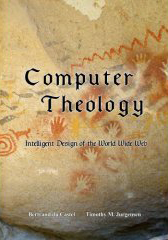PRESS
COMPUTER THEOLOGY |
||||
|
Our Father which art in
heaven, First, the
prayer establishes the participants in the transaction. It does this through
the form of a deictic expression; an expression that
implies spatial, temporal or personal orientation based on the context of the utterance.
Consequently, it suggests that the language of prayer, and the infrastructure
through which it is conducted, be capable of establishing deictic context. The supplicant who initiates the
conversation is one party, or, more appropriately in this particular case, a
representative member of one party consisting of some inferred but formally
unspecified group. This must be inferred through the use of the plural
possessive pronoun. The supplicant is the inferior party to a transaction where
the act of authentication is establishing the identity of the supplicant in the
eyes of the other party without reciprocity. The other party that the
supplicant approaches, we will generically refer to as the sentinel. The
sentinel recognized by the supplicant as “Our Father which art in heaven,”
establishes the other party: the Christian God. In Sermons by Hugh Latimer, edited by George Elwes Corrie, the sermon
of June 9, 1536 afternoon, spells out: “It is either all one thing, or else not
much different, to say, children of the world, and children of the devil;
according to that that Christ said to the Jews [John viii], ‘Ye are of your
father the devil:’ where as undoubtedly he spake to children of this world. Now
seeing the devil is both author and ruler of the darkness, in the which the
children of this world walk, or, to say better, wander; they mortally hate both
the light, and also the children of light.” Sentinel, are you awake? The subsequent
use of this prayer as a standard element in most Christian worship services
forms a ritual reminder of the social ecosystem participants’ ultimate source
of trust. The subject of the discourse is the establishment or affirmation of a
compact with God. In this case, the compact forms an attempt to achieve a
desired outcome based on the perception that God can elicit this desired
result; thus, the plea to affirm the rules and recognition of who the final
arbiter of the transaction is. We might view this as a degenerate case of
arbitration between two parties as to the rules that will govern the ensuing
transaction and the arbiter who will make the final determination, because the
supplicant is saying, “We’ll do it your way.” Once we’ve agreed to that, it’s
time to enter into the desired exchanges. The considerations due each party are
relatively clear cut. The supplicant seeks material and procedural content. The
sentinel will receive in return procedural content. Metaphorical bread and
forgiveness comprise the consideration given to the supplicant and veneration
is the consideration given to God. The conclusion of the transaction is also a
degenerate case involving only one party, the supplicant essentially saying, “I’m
satisfied with the results so I’m finished.” In true and earnest prayer, a supplicant generally voices most heartfelt needs, devoid of ambiguous language and obtuse meaning. As a consequence, the form and content can be extremely succinct, but with perhaps just a bit of imagination we can still discern the steps of a formal transaction. Consider the short prayers that we noted earlier in this chapter. The first (“I’m still here”) corresponds to a simple recognition of presence; in computer networking parlance we |
||||
|
||||
© Midori Press, LLC, 2008. All rights reserved for all countries. (Inquiries) The contents of ComputerTheology: Intelligent Design of the World Wide Web are presented for the sole purpose of on-line reading to allow the reader to determine whether to purchase the book. Reproduction and other derivative works are expressly forbidden without the written consent of Midori Press. Legal deposit with the US Library of Congress 1-33735636, 2007.
|
ComputerTheology Intelligent Design of the World Wide Web Bertrand du Castel and Timothy M. Jurgensen Midori Press, Austin Texas 1st Edition 2008 (468 pp) ISBN 0-9801821-1-5 |
Book available at Midori Press (regular) |
